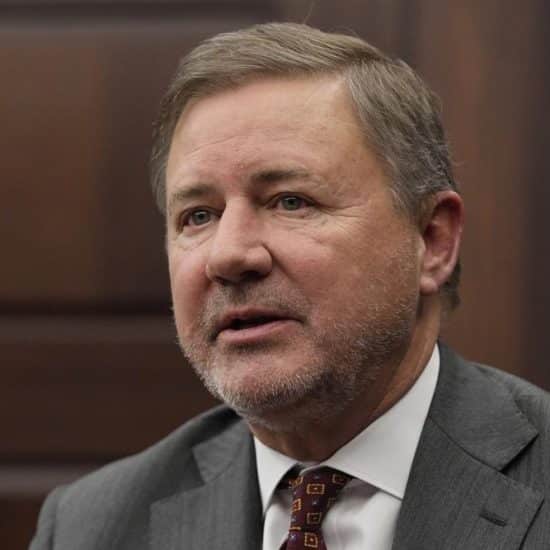No one who has talked with Southern Baptist Convention president Johnny Hunt can doubt that he is a man who is deeply concerned about dipping baptism figures in the SBC. For the fourth straight year Southern Baptist churches baptized fewer people than the year before. They have reached the lowest level since 1987 after peaking in 1972.
Baptisms dropped just over 1 percent to 342,198 last year, compared with 345,941 in 2007. Total membership of Southern Baptist churches was 16,228,438 last year, down nearly 38,400 from 2007.
The question on the mind of SBC leadership is, “How can we reverse this trend?”
Hunt recently told the editor of the Florida Baptist Witness that “the Southern Baptist Convention is a ship ‘adrift’ and so low in the water that it ‘probably’ needs to rid itself of some unnecessary ‘cargo’ to ‘float and be healthy and strong again.’ ”
Danny Akin, president of Southeastern Baptist Theological Seminary, in an April 16 address to the students asked, “How do we change this and experience a much needed course correction?” He observed, “we are fractured and factionalizing. We are confused having lost our spiritual compass.”
As a means of correcting the course and offloading unnecessary cargo (to pursue their analogies) they have offered the Great Commission Resurgence. The conservative resurgence was so successful, it is only natural to attempt a duplication, I suppose.
The GCR began as 12 axioms included in Akin’s seminary address, but was pared to 10 points as it was refined by proponents. The 10 surviving points are: 1) A Commitment to Christ’s Lordship; 2) A Commitment to Gospel-Centeredness; 3) A Commitment to the Great Commandments; 4) A Commitment to Biblical Inerrancy and Sufficiency; 5) A Commitment to a Healthy Confessional Center; 6) A Commitment to Biblically Healthy Churches; 7) A Commitment to Sound Biblical Preaching; 8) A Commitment to a Methodological Diversity that is Biblically Informed; 9) A Commitment to a More Effective Convention Structure; and 10) A Commitment to Distinctively Christian Families. (See greatcommissionresurgence.org for the full text; and betweenthetimes.com for the text of Akin’s comments.)
Again, who could possibly fault SBC leadership for seeing that a problem exists and for wanting to do something about it? And, with the exception of their demand for lockstep agreement on how the Bible came be inspired, I can whole-heartedly support the concept of each point.
In fact, there is a great deal in the GCR that I find commendable. Consider what Akin says about race, for example: “Until we get right about race I am convinced God will not visit us with revival. The call for a Great Commission Resurgence will not move heaven, and it will be scoffed at by the world for the sham that it is! ‘We will love you and welcome you if you look like us and act like us!’ What kind of gospel madness is this?”
Should Southern Baptists support the GCR? Obviously, it is for each of them to decide. I can offer my own support and do. But in my heart of hearts, do I think it will make any real difference? No, I do not. Why would I say such a negative thing?
First of all, alongside Akin’s eloquent statement on race, consider another statement. He tells the students, “Are you questioning inerrancy? Then repent! Do you deny inerrancy? Then go join another denomination. We will love you and pray for you, but we do not want you infecting our people with a spiritual disease that is always fatal to the Church of the Lord Jesus. Inerrancy and the sufficiency of the Bible in all matters of faith and practice is not up for debate in the Southern Baptist Convention. It alone will give us the necessary weapons to take on and take down what Newsweek (8-13-08) calls ‘a newly muscular secularism.’ ”
When an SBC leader tells me, “Because you understand the Bible differently than I, get out!” it’s hard to feel the love. We can say all the right words; we can even talk about how much we love others, but until we are willing to actually love others we are only being a noisy gong or a clanging symbol.
This, I believe, is at the heart of our problem. We talk a good gospel, but are not willing to put the gospel into actual practice by acting lovingly — even toward one another.
But this isn’t our only problem. Aside from that is the question of a faulty theology. Did Akin really say that belief in inerrancy is the only thing that will give us the necessary weapons to take on secularism? Yes, he did. There it is in black and white.
Without being contentious, perhaps this is part of our problem. Isn’t it the Spirit of the Living God who will give us what we need to battle the forces of darkness? As I read doctrinal statements in recent days I am struck by the number of times the author or speaker feels compelled to say, “I was totally in support of the conservative resurgence. But ….” It is almost as if there is a common, underlying recognition that the emperor has no clothes, but since no one is willing to admit such a thing publicly, they go on affirming how elegant his new suit is.
But even this is not why I believe that the GCR is not the answer to declining statistics. However well intended the GCR may be and however well it may phrase elements of the gospel, we Southern Baptists (I guess I can still be one even after Danny Akin told me to get out) have a tendency to transform the spiritual into physical things we can control.
If the reasons for our declining baptisms and falling membership figures are to be found in structural and programmatic deficiencies then GCR will put us on the right course, perhaps.
But what if factors causing the decline cannot be influenced by developing new programs or by streamlining our organizational charts? The prospect is frightening because it means that our typical way of responding to challenges of the past will not work in the future.
Although the bureaucracy of the Southern Baptist Convention may well be bloated as Akin alleged in his address, restructuring the flow chart is akin to rearranging the deck chairs on the Titanic (to continue the nautical theme). There is potentially some value in keeping busy, but don’t expect it to keep the boat afloat.
I think Henry Blackaby put his finger exactly on the point when Baptist Press reported, “If Southern Baptists want to see a ‘Great Commission Resurgence,’ Henry Blackaby believes they need to focus on the relationship between disciples and the living Lord Jesus, not launch a new emphasis on evangelism. ‘I have felt for a long time that Southern Baptists have focused on evangelism and missed discipleship,’ Blackaby told Baptist Press May 11. ‘The most important part of the Great Commission is “teach them to practice everything I have commanded you.” That’s discipleship and that’s the heart of the Great Commission. If we want to have a resurgence in the Great Commission, there’s got to be a refocusing on the priorities of Christ for discipleship.’ ”
It was Pogo, a comic strip figure from a bygone time, who is credited with saying “We have met the enemy and it is us.” There is a way through this, I believe. And both Akin and Blackaby have addressed it.
Repentance. “We don’t talk about repentance,” says Blackaby. “Repentance is the essence of what God says throughout the Bible: ‘You have lost the relationship. Return to me and then you will experience me returning to you.’ When that happens, the manifest presence and power and activity of God is very real.”
Alas, Akin, too, speaks of the need to repent. “We must accept our constant need to humble ourselves and repent of pride, arrogance, jealousy, hatred, contentions, lying, selfish ambitions, laziness, complacency, idolatries and other sins of the flesh; pleading with our Lord to do what only he can do in us and through us and all for his glory.” And, if you don’t agree with me, get out of my Convention!
Jim White is editor of the Virginia Religious Herald.


